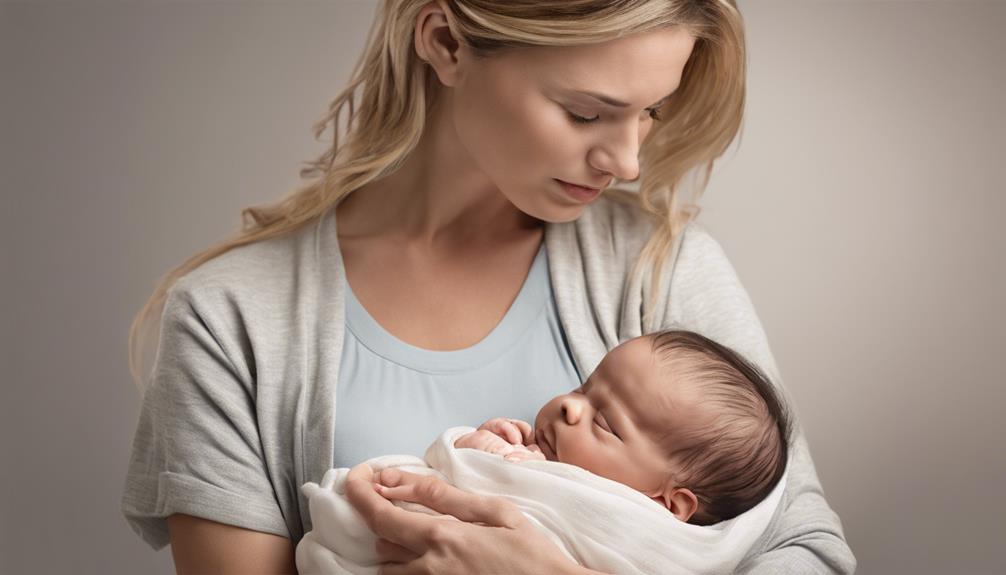On the path to nurturing newborns, the ‘Essential Newborn Nursing Care Guide’ serves as a beacon, highlighting crucial steps to ensure their health and safety.
With a focus on thorough care during the critical early stages of life, this guide equips healthcare professionals with essential knowledge and practical strategies.
From evaluating newborns to providing essential care components, this resource offers a roadmap for delivering quality care.
As we navigate the intricate world of newborn nursing, let's explore the invaluable insights this guide holds to optimize our practices and enhance outcomes for these precious little ones.
Key Takeaways
- Assess newborn well-being promptly using Apgar scores and physical exams
- Provide essential care like thermal regulation, identification, and registration
- Recognize and respond to newborn cues for feeding and comfort
- Encourage and support breastfeeding initiation, monitoring, and education
Newborn Assessment and Evaluation
Upon the immediate birth of a newborn, our primary focus is to assess and evaluate their life signs and overall well-being through a thorough examination process. This includes promptly administering an Apgar score at 1 and 5 minutes to gauge the baby's heart rate, respiratory rate, muscle tone, reflex irritability, and color. We pay particular attention to signs of respiratory distress using tools like the Silverman and Andersen index, which help us assess distress indicators such as chest movement, retraction, dilatation, and grunt.
Nursing care at this stage is critical in ensuring the newborn's well-being. We meticulously observe the baby's physical appearance, looking for any observable conditions or defects. Additionally, we conduct thorough respiratory assessments to identify any potential issues. Measuring the height and weight of the newborn aids in determining their maturity level. Daily weight checks are also essential for identifying abnormalities early on, allowing us to provide the necessary support and interventions promptly. Our dedication to meticulous assessment and nursing care sets the foundation for the newborn's health journey.
Basic Newborn Care Procedures

What essential steps are involved in guaranteeing the well-being of a newborn through basic care procedures after delivery?
Providing essential care for a newborn is pivotal for their health and development. Immediately after birth, evaluating the baby's well-being is paramount. This includes conducting standard evaluations like the Apgar scoring system at 1 and 5 minutes post-birth, appraising the infant's heart rate, respiratory rate, muscle tone, reflex irritability, and color.
Respiratory evaluations using indexes such as Silverman and Andersen help gauge distress levels in newborns. Physical examinations are crucial to detect any observable conditions or defects. Daily weight checks, height and weight measurements, and necessary lab tests like heel-stick for blood studies are also essential.
Additionally, immediate care at birth involves providing thermal care, ensuring equipment readiness, newborn identification, creating footprints for identification purposes, and registering the birth for tracking. These essential care procedures guarantee the well-being of the newborn and set them on a healthy path.
Understanding Newborn Cues and Communication
Recognizing and interpreting newborn cues is an important aspect of nurturing and caring for infants in their early stages of life. Newborns communicate through cues such as rooting, sucking, crying, and body movements, indicating their needs for hunger, discomfort, or fatigue. By understanding these cues, caregivers can respond promptly and appropriately, promoting the baby's well-being.
| Newborn Cues | Description |
|---|---|
| Rooting | Turning the head and opening the mouth when cheek is stroked |
| Sucking | Clenching fists and sucking when near a nipple or pacifier |
| Crying | Different cries for hunger, pain, discomfort, or fatigue |
Effective communication with newborns involves observing not only these physical cues but also non-verbal cues like facial expressions and body language, which provide insight into the baby's emotional state. Responding with sensitive care to these cues not only meets the newborn's immediate needs but also fosters a strong bond between the caregiver and the infant, creating a nurturing environment that promotes security and trust.
Managing Newborn Feeding and Nutrition

Understanding and addressing the nutritional needs of newborns is fundamental in ensuring their healthy growth and development, particularly through effective feeding practices. Initiating breastfeeding within the first hour of birth fosters bonding and provides essential nutrients for newborns. Monitoring feeding frequency and being attentive to newborn cues are essential to guarantee adequate nutrition and hydration for best health.
Encouraging exclusive breastfeeding for the first six months can lower the risk of infections and boost the newborn's immune system. Educating parents on proper breastfeeding techniques and available support resources can enhance feeding success and the well-being of the newborn.
Weight monitoring and evaluating feeding ability play critical roles in newborn nutrition, allowing healthcare providers to track growth and identify any potential issues early on. By prioritizing these aspects of newborn feeding and nutrition, we can promote the health and development of the newborn while strengthening the bond between parent and child.
Tips for Soothing and Comforting Your Newborn
To provide comfort and security to your newborn, consider incorporating soothing techniques like swaddling and gentle rocking. Swaddling can help recreate the snug feeling of being in the womb, offering a sense of safety and warmth to your little one. Gentle rocking or motion, whether in a rocking chair or baby swing, can help calm a fussy newborn by mimicking the familiar movements from the time in utero.
Using white noise, such as a soft lullaby or a sound machine, can create a peaceful atmosphere for your baby, masking other sounds and promoting relaxation. Introducing a pacifier can also be soothing, as it satisfies your newborn's natural sucking reflex and provides comfort.
Moreover, skin-to-skin contact is a powerful way to bond with your baby, regulate their body temperature, and increase their sense of security and comfort. By combining these techniques, you can create a nurturing environment that helps your newborn feel safe and content.
Frequently Asked Questions
What Are the Essential Newborn Care Guidelines?
We focus on essential newborn care guidelines, emphasizing thermal care, infection prevention, breathing initiation, feeding support, and danger sign monitoring. Skin-to-skin contact, delayed bathing, and clean birth practices are crucial for newborn well-being.
What Are the 5 Steps of Newborn Care?
We secure newborn care by establishing airway and circulation, identifying the baby, giving Vitamin K, starting breastfeeding, and maintaining temperature. These steps are crucial for the newborn's well-being and shift into the world.
What Is the Essential Care of a Normal Newborn?
We guarantee a normal newborn's well-being by establishing an open airway, promoting circulation, Vitamin K administration, initiating breastfeeding for nutrients and bonding, maintaining temperature, and daily monitoring for health and feeding. These steps support newborn survival and health.
What Is the Role of the Nurse in Essential Newborn Care?
In essential newborn care, we play an important role in evaluating well-being, conducting Apgar scoring to evaluate health, respiratory evaluations to assess distress, identifying conditions through exams, and providing care interventions like Vitamin K, breastfeeding initiation, and routine care.
Conclusion
As we initiate on this journey of caring for newborns, let's remember that we're the architects of their future well-being. Like delicate flowers in need of tender nurturing, our actions today will shape their tomorrow.
Let's approach each task with precision, empathy, and unwavering dedication, for in our hands lies the power to make a profound impact on these tiny lives.
Together, let's pave the path towards a brighter, healthier future for our newborns.










